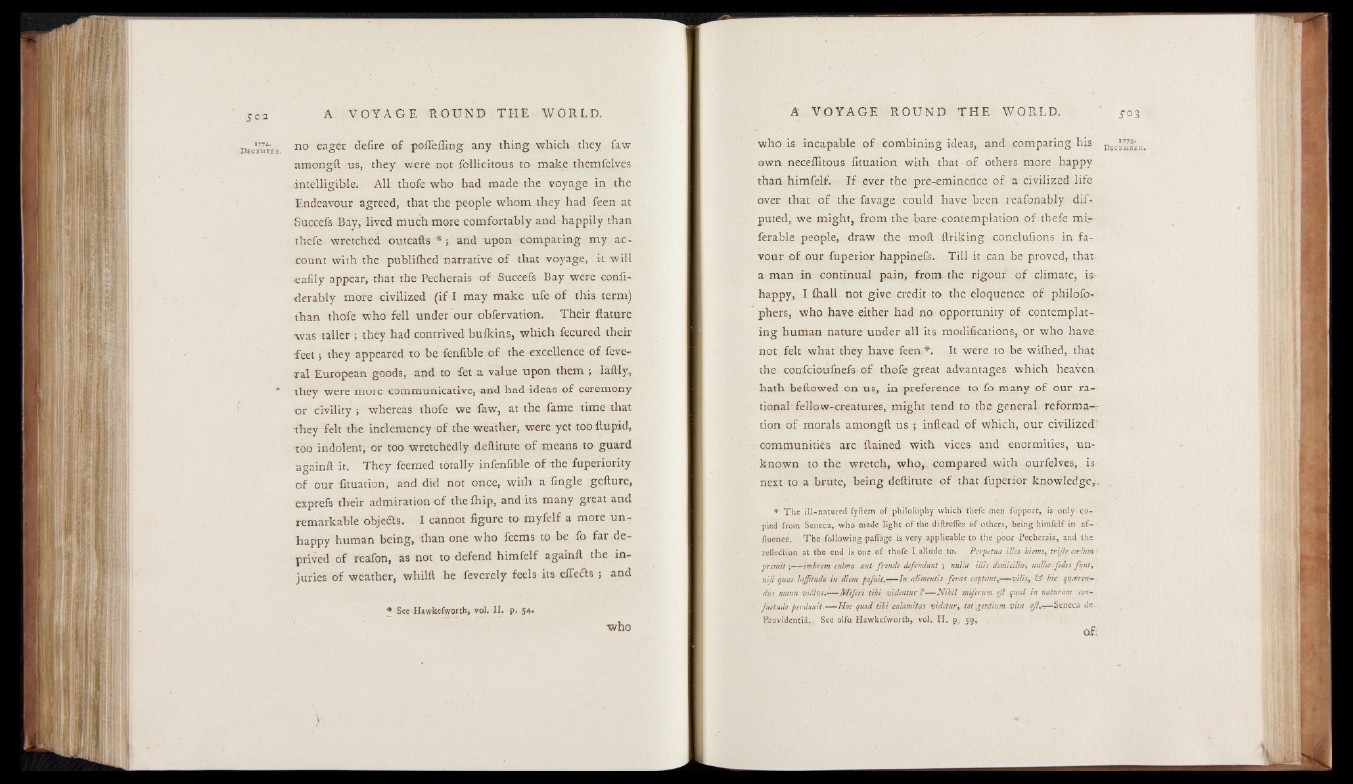
decYmbek. no eaSer defire of poffeffing any thing which they faw
amongft us, they were not follicitous to make themfelves
intelligible. All thofe who had made the voyage in the
Endeavour agreed, that the people whom they had feen at
Succefs Bay, lived much more comfortably and happily than
thefe wretched outcafts * ; and upon comparing my account
with the publiflied narrative of that voyage, it will
«afîly appear, that the Pécherais of Succefs Bay were confi-
-derably more civilized (if I may make ufe of this term)
than thofe who fell under our obfervation. Their flature
was taller ; they had contrived bufkins, which fecured their
feet ; they appeared to be fenfible of the excellence of feve-
ral European goods, and to fet a value upon them ; laftly,
' they were more communicative, and had ideas of ceremony
or civility ; whereas thofe we faw, at the fame time that
they felt the inclemency of the weather, were yet too ftupid,
too indolent, or too wretchedly deftitute of means to guard
againft it. They feertfed totally infenfible of the fuperiority
of our Ctuation, and did not once, with a Engle gefture,
exprefs their admiration of the fhip, and its many great and
remarkable objects, I cannot figure to ndyfelf a more unhappy
human being, than one who feems to be fo far deprived
of reafon, as not to defend himfelf againft the injuries
of weather, whilft he fevcrely feels its efleéts ; and
* See Bawkefworth, vol. II. p. S4>
who
who is incapable of combining ideas, and comparing his December»
own neceflitous fituation with that o f others more happy
than himfelf. If ever the pre-eminence of a civilized life
over that of the favage could have been reafonably dif-
puted, we might, from the bare contemplation of thefe mi—
ferable people, draw the moft linking conclufions in favour
of our fuperior happinefs. Till it can be proved, that
a man in continual pain, from the rigour of climate, is
happy, I fliall not give credit to the eloquence of philofo-
phers, who have either had no opportunity of contemplating
human nature under all its modifications, or who have-
not felt what they have feen *. It were to be wifhed,.that
the confcioufnefs of thofe great advantages which heaven
hath beftowed on us, in preference to fo many of our rational
fellow-creatures, might tend to the general reformation
of morals amongft us ; inftead of which, our civilized!
communities are ftained with vices and enormities, unknown
to the wretch, who,, compared with ourfelves, is-
next to a brute, being deftitute of that fuperior knowledge,,
* T h e ill-natured fyftem of philofophy which- thefe men fupport, is onlyhcopied
from Seneca, who made light of the diftrefles o f others, being himfelf in affluence.
The.following paflage is very applicable to the poor Pecherais, and the
reflexion at the end is one of thofe I. allude toi- Perpctua illobhiems, trifle ccelum •
premit;— irnbrem cuhno aut fronde defehdunt j nulla tills doth!cilia, null#.;fs.des funt,
nifi qttas laffitudo in diem pofuit:— In alimentis feras captant,— vilis, &' hie quatren—
dus mamt vifills.-—Miferi tibi videntuv f— Nihil miferum ejl quod in naturam conflict
udo per dux it.'—-Hoc quod tibi calamitas videtur, tot gentium vita ejl%-— Seneca de.
Rrovidentia,. See alfo Hawkefworth, voK I I , p., 59,
of: